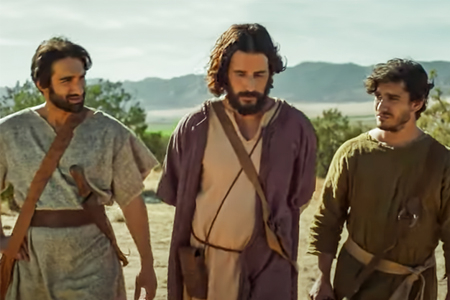James and John, the sons of Zebedee, approached Jesus. ‘Master, they said to him, ‘we want you to do us a favour.’ He said to them, ‘What is it you want me to do for you?’ They said to him, ‘Allow us to sit one at your right hand and the other at your left in your glory.’ ‘You do not know what you are asking’, Jesus said to them. ‘Can you drink the cup that I must drink, or be baptised with the baptism with which I must be baptised?’ They replied, ‘We can.’ Jesus said to them, ‘The cup that I must drink, you shall drink, and with the baptism with which I must be baptised you shall be baptised, but as for seats at my right hand or my left, these are not mine to grant; they belong to those to whom they have been allotted.’
When the other ten heard this they began to feel indignant with James and John, so Jesus called them to him and said to them, ‘You know that among the pagans their so-called rulers lord it over them, and their great men make their authority felt. This is not to happen among you. No, anyone who wants to become great among you must be your servant, and anyone who wants to be first among you must be slave to all. For the Son of Man himself did not come to be served but to serve, and to give his life as a ransom for many.’ (Mark 10:35-45)
Reflection - Servants, not masters
They’re at it again! One might be forgiven for wondering at just how slow the disciples are in getting Jesus’ message. For weeks he has been instructing them about the Kingdom of God and the conversion of heart needed to be his followers.
This Sunday’s Gospel episode shows that, yet again, they just don’t get it. This time it is James and John, who together with Peter form the ‘inner circle’, the group of disciples closest to Jesus. James and John are asking for the highest places of honour when Jesus comes into his ‘glory’.
While they understand that Jesus is the Messiah, they misunderstand what kind of Messiah he is and what kind of Kingdom he is bringing. While Jesus continues to talk about the path his own life will take through suffering, death and resurrection, the disciples are so focussed on themselves that they ignore his words.
Rather than brush aside the brash request of James and John, Jesus attempts to draw them deeper by hinting at the path of true discipleship. Using two biblical motifs, the cup (the fate that lies ahead of a person) and baptism (not the sacrament but the idea that undergoing trials and dangers is like passing through stormy, turbulent waters) Jesus asks if they can really commit to sharing his life and mission. Without hesitating they say, “We can,” and Jesus affirms that they will. But, as for the places of honour, these are for the Father to assign.
The other ten disciples have been standing near by, eavesdropping on the conversation between Jesus, James and John. They are angry at hearing of their attempt to get in first and claim the seats of honour for themselves – no doubt, they would have liked to do the same!
Jesus takes the opportunity to tell them, yet again, that real greatness in the Kingdom of God lies in self-sacrificing service to humanity. Authority among the people of Christ is not to be exercised by ‘lording it over’ others or by using positions and capacities for self-serving ends. Authority is always to be at the service of and for the benefit of others. Disciples are called to be servants, not masters.
As we follow Jesus through the Gospel, we see that his ‘authority’ over demons, illness and death, as well as his teaching, always brings liberation, restores health and wholeness and sets others at rights with God and neighbour.
That is the pattern that he asks the disciples to follow. The only way to enter into Jesus’ ‘glory’ is to follow him in self-sacrificing service of humanity, as one who gives up their life as a ransom for many.
You can download and print our prayers and reflection for this Sunday.
pdf
Celebrating At Home 29th Sunday of Ordinary Time [PDF]
default
Celebrating At Home 29th Sunday of Ordinary Time [ePub]















